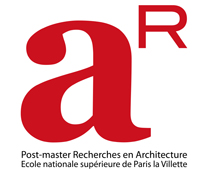International Post-Master’s Degree
Research in Architecture - ENSAPLV
Toutes les versions de cet article : [English] [français]
The territorial, urban and architectural changes and transformations to be seen in many places in the world at the present time represent a challenge that goes far beyond the spatial aspects involved.
Hence, simply observing these transformations will not suffice : they must be understood in order to enable action.
This is the direction in which mobilisation of researchers is not only useful, but necessary. Research and training undertaken on the basis of the questions concerning these phenomena of transformation and change make up genuine frameworks for reflexion and construction of knowledge and skills, founded on scientific requirements.
To the extent that these observable changes are related both to spatial and social constellations, the approaches envisioned to comprehend the mechanisms at work reveal the changes in thinking and the actions necessary to objectivise new dynamics. The object of this post-master’s degree is to enable young researchers to understand these mechanisms and to produce essential scientific knowledge in the fields of architecture, urbanism and landscape issues.
The degree will help them to acquire a transversal scientific background that explicitly addresses these phenomena and offers the opportunity for a first experience in research within a laborator.
Each laboratory – in relation with its research subjects, identity and theoretical approaches – proposes a research theme to structure the teaching program and independent oversight that provide students with a specific methodological and scientific framework to develop their own work. In some cases, joint oversight can be foreseen on the basis of the experience and knowledge acquired during the transversal program. End-of-year juries will be made up of researchers from different laboratories responsible for assessing these post-master’s theses.
Processes in creating architectural and urban spaces
This theme will deal with the activities involved in architectural, urban or landscape conception, considered as practices that take part in the definition of a project, their programming and reception. It will analyse how all these issues come to be re-examined and transformed due to the development of contexts and professional and societal concerns, for example, the increasing awareness of the stakes involved in sustainability and democratisation of public action. This theme is structured around three approach axes. The first deals with knowledge, modes of action and use that contribute to creating architectural and urban spaces. It analyses the systems of actors who gravitate around this production, these processes, procedures and tools mobilised, as well as the role of economic, social, political and environmental problematics involved in the negotiations and arbitrations carried out. It also questions the modalities of articulation between different forms of knowledge and legitimacies accruing to political and professional actors (either users or experts), as well as those partners in civil society (citizens, inhabitants, users).
A second approach axis deals with the mediations utilised by actors in architecture and urban planning. This involves examining a whole ensemble of elements entering into the creation, especially symbolic, of projects and including those at work in conception or criticism, as well as the contexts in which these processes take place and the words or images through which the projects are elaborated, spread, presented, criticised, etc. A third axis takes up the question of the construction of professional identities and polarities in the field of production of architectural and urban spaces, on the basis of the practices and discourses developed, placed in their socio-historical context.
Link : web site of DPEA and DPEA on web site of ENSAPLV
